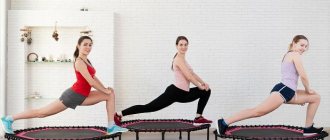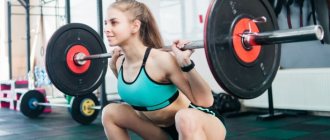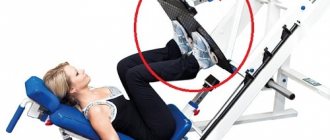All people are different. Some are lucky and have periods without noticeable symptoms, while others have to cancel training during “these days.” Understanding your menstrual cycle and the hormonal fluctuations your body experiences will help you take advantage of each phase of the period.
Below, we'll explore the ins and outs of your menstrual cycle, drawing on the experience and advice of medical experts, coaches, and elite athletes to help you learn how to work with your hormones, rather than fight them.
Is it possible to continue training during menstruation?
There is no clear answer to this question simply because everyone’s reaction is different. The point is that when your period starts varies, but most women will experience it regularly and it shouldn't stop you from exercising.
Hormones work differently during menstruation. Some people don't experience much pain or sluggishness during their periods and live and exercise as normal. Some experience high levels of PMS (premenstrual syndrome) in the days leading up to their bleeding, which is accompanied by a variety of symptoms - and some continue to feel ill at the start of their period, while for others these symptoms go away completely. Depending on your individual physiology, you can use the first week of your cycle as a time for rest and recuperation, or vice versa - for intense training and participation in competitions.
If you feel you can, train as hard as you can. If not, then rest. The most important thing is to listen to your body.
Which loads will be useful on critical days, and which ones should be excluded?
If you do not play sports professionally, but train for yourself, then it will be enough to reduce the load by 25-50%. Instead of 10 km, run only five, instead of 20 squats, do 10. And then you won’t even have to give up high-intensity loads like Tabata, interval training, CrossFit and sprints.
Olga Novikova
fitness trainer
Pilates and stretching can be practiced without restrictions. But there are certain exercises that I do not recommend, as they can provoke a reverse flow of blood and endometrial tissue particles from the uterine cavity. This increases the risk of developing gynecological diseases.
The trainer recommends eliminating:
- inverted asanas in yoga;
- lower abdominal exercises;
- abdominal exercises when the head is lower than the legs;
- gluteal bridge;
- leg press.
Women's problem: who should not exercise on menstrual periods?
How key hormones fluctuate in the menstrual cycle
The menstrual cycle is not just a week of menstruation, it is the entire period from the start of bleeding until the next menstruation. On average, the cycle lasts 28 days and consists of 3 key phases.
In the follicular phase, which shortens significantly with age and lasts about 14 days in women aged 18-24 years (compared to 10 days in women aged 40-44 years), there is a gradual increase in the hormone estradiol until the ovulation phase. Estradiol is essential for maintaining healthy bones and muscles, as well as cognitive function.
During the ovulatory phase, which lasts about three days, luteinizing hormone is released. Within 36-48 hours, several waves of release occur and its concentration in the blood plasma increases significantly. At this time, the concentration of estradiol decreases slightly (but it is still significantly higher than at the beginning of the cycle) and a smooth increase in the hormone progesterone begins. Its main purpose is to prepare the body for pregnancy, as a result of which the uterine mucosa thickens.
After ovulation, the luteal phase begins, which lasts about 14 days and lasts until the next menstrual cycle. In this phase, progesterone increases and the concentration of estradiol increases again, reaching a peak in the middle of the phase. Then all hormones begin a gradual decline and reach their original values by the beginning of the next cycle.
Delayed menstruation due to increased physical activity: what to do
Most often, girls who have never engaged in intense physical exercise before ask whether menstruation can be delayed from sports. When a woman comes to the gym or sports class for the first time, her pelvic muscles are subjected to unusual stress. Sometimes this causes a short-term cycle failure. Usually after two months the cycle returns to normal. This is considered acceptable.
In more serious cases, you should definitely try to understand why there may be a delay in menstruation if the pregnancy test is negative. The reason for the delay may be a sudden load, which causes stress in the body, but it does not always play a major role.
Causes of delayed menstruation, statistics
Firstly, heavy training combined with other loads can cause chronic fatigue in a girl. And this is a common cause of cycle disruption. Imagine the stress that intense training puts on the body, combined with insufficient sleep and dietary restrictions to achieve the fastest results.
Secondly, the reason may be a lack of adipose tissue. Often girls who started playing sports, and then lost their periods, adhere to strict diets to achieve results. If the loss of adipose tissue occurs abruptly, then in most cases problems with the cycle arise: up to amenorrhea, cessation of ovulation, absence of the ovarian cycle and changes in the endometrium.
Expert opinion
The percentage of adipose tissue in a woman’s total weight is normally considered to be 17-20%. In order for the abs to be visible, you need to reduce it to 10-12%. It is precisely at this ratio of adipose tissue that problems with the reproductive system begin. In women over 45 years of age, this can lead to premature menopause.
Obstetrician-gynecologist of the highest category Oksana Anatolyevna Gartleb
Cause of delayed menstruation
How concentrations of estradiol and progesterone affect the body during the cycle
It's worth repeating that everyone is different and reacts differently to hormonal fluctuations, but it's important to understand the effects that two key hormones (estradiol and progesterone) can have throughout the cycle. As your hormone levels fluctuate, you may notice changes in your energy levels and body temperature, your ability to focus and motivate yourself, and your overall performance level. And this is important to take into account in training.
Estradiol is one of the two main female reproductive hormones produced by the endocrine system. Its levels rise during the follicular phase until ovulation occurs. The positive effect of estradiol on cognitive function means that the first half of the cycle can be selected for planning and executing tasks that require a lot of attention. At this time, you can notice a surge of energy, which is ideal for intense and strength training.
Progesterone is another main female hormone that is secreted in the second half of the menstrual cycle. It causes an increase in basal body temperature, which can be especially important for those exercising in hot climates. High progesterone levels also contribute to PMS symptoms such as breast tenderness, bloating, and mood swings.
By taking the time to figure out your unique menstrual cycle and understanding how you feel during each phase, you can plan your training and competition. You'll know exactly what your energy levels are and can plan for rest and recovery during low periods.
Sports during menstruation: benefits and harm
In fact, correct physical activity has a positive effect on a woman’s body. This is expressed in:
- Reducing pain during menstrual bleeding
- Improving blood circulation
- Eliminating PMS
- Normalization of an unstable cycle
Harm to the female body can only be caused by incorrect loads during menstruation, as well as neglect of personal hygiene rules during training and continuation of exercises despite poor health.
How to adapt your training and competition schedule
Professional cyclist and coach Yasmin Müller works with 20 athletes of different levels and ages on individual plans that take into account menstrual cycles.
“I see big differences in the first week of my menstrual cycle,” explains Yasmin. – Many of my clients experience decreased performance in the first two or three days of menstruation, which is often associated with pain. They cannot do intense and strength training, while others experience a burst of energy and can gain a lot. During the follicular phase, they are in a good mood and want to try new things.”
Former professional cyclist and Olympian Nikki Brammeier, who now also coaches, speaks openly on her social media about the competitive experience with her menstrual cycle in mind.
“I have found that understanding how hormones fluctuate throughout my cycle allows me to work with my body and better manage my energy,” she notes. – Most often I participated in competitions in the follicular phase. But during the luteal phase, when I wasn't feeling my best, I could get more benefit from intense training, and if I had a key start at that time, I was compromising my body. It allowed me to be kinder to myself and not beat myself up if things didn’t work out.”
Nikki says there is no need to completely rewrite the training plan. You just need to adjust certain workouts to suit your well-being.
“I was able to synchronize my workouts with my menstrual cycle and understand what was happening with my hormones at different times throughout the month. The training plan hasn't changed much, but understanding my body has allowed me to work in sync with my body."
How to prepare for the start of your menstrual cycle
Dr. Stacy Sims, in her book How to Match Food and Exercise to Your Unique Female Physiology, offers a selection of supplements that can help alleviate severe PMS symptoms (if you suffer from them). The kit includes the following supplements, which should be taken every day for a week before the start of menstruation:
- 250 mg magnesium
- 45 mg zinc
- 80 mg baby aspirin
- 1 g omega-3 fatty acids (flaxseed oil or fish oil)
We provide this information for informational purposes - before taking any medications or supplements, you must undergo tests and consult with a specialist.
Yasmin Muller has advised some of her PMS clients to try these supplements and has reported positive results. “Those who took supplements in the week leading up to their period tended to have an easier time in the first week of their menstrual cycle,” she explains. However, she admits it's not a magic pill: "But for some, I still fine-tune the training program with less intense sessions during this period or allow time for recovery."
Action plan:
- Study your menstrual cycle and mark transition points between phases
- Get tested and consult with a specialist about the need to take supplements
- Check how you handle different types of training in each phase
- Adapt your training plan and competition schedule to suit your individual needs
- Progress and achieve success
How to restore the body?
As a rule, the training itself does not become the main reason for delayed menstruation other than pregnancy. In the vast majority of cases, a delay in menstruation occurs due to stress and fatigue, the treatment of which must be comprehensive. Often this is accompanied by a lack of adipose tissue.
In case of nutrient deficiency, special dietary supplements with polyunsaturated fatty acids and primrose oil help restore the cycle. For example, Ginocomfort - evening primrose oil - is a product developed by specialists from the pharmaceutical company VERTEX and has the necessary documents and certificates. Dietary supplements with evening primrose oil not only help normalize the cycle, but also help mitigate the symptoms of PMS and strengthen the immune system.
Therefore, when a doctor hears from a patient complaints “I play sports - my periods have disappeared,” he first of all pays attention to side factors (stress, chronic fatigue, weight loss).
If you are just starting to exercise and notice cycle disruptions for a few days, this is not a cause for concern. Rest, eat well, get adequate sleep, take vitamins and supplements. But if the problem does not solve, be sure to consult a doctor.











